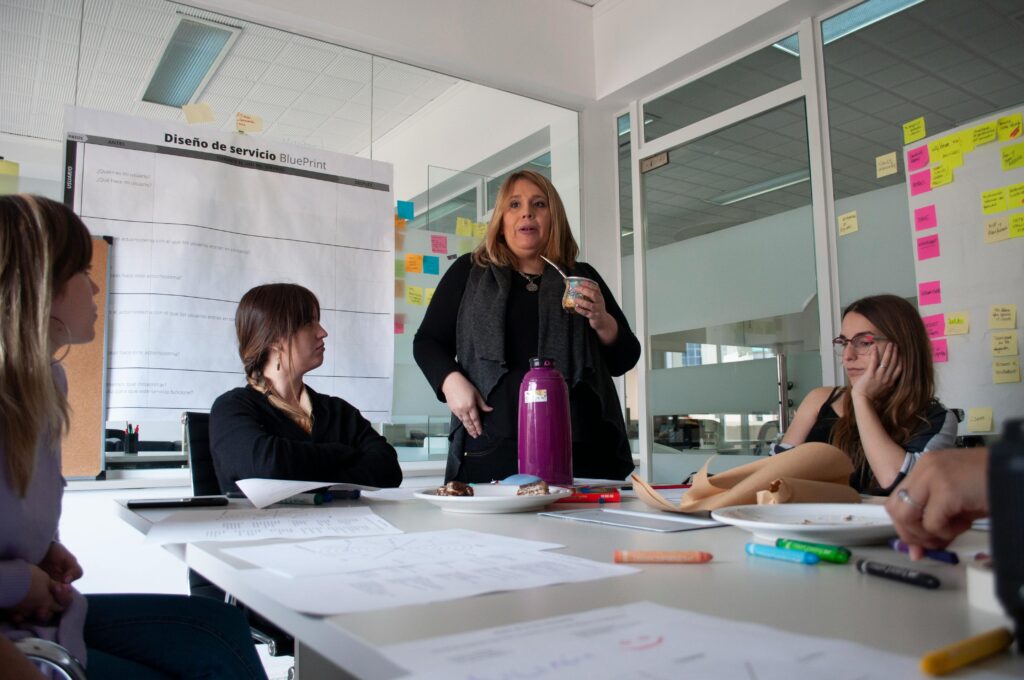Full Stack Developer Jobs are versatile professionals in the tech industry who have expertise in both front-end and back-end development. They are responsible for creating comprehensive web applications and systems that encompass everything from user interfaces to server-side logic and databases. Full Stack Developers are highly sought after due to their ability to handle various aspects of web development, making them crucial to modern software development teams.
Origin and Evolution of Full Stack Development
The concept of full stack development has evolved alongside the development of web technologies. Here’s a brief overview of its origin and evolution:
Early Beginnings
- 1960s-1980s: The early days of computing were characterized by monolithic systems where developers had to manage both hardware and software. The distinction between front-end and back-end development wasn’t as pronounced because applications were often tightly integrated with hardware and operating systems.
- 1990s: The advent of the World Wide Web marked the beginning of modern web development. Technologies such as HTML and JavaScript emerged for front-end development, while server-side languages like PHP, Perl, and ASP (Active Server Pages) were used for back-end development. However, developers often specialized in either front-end or back-end technologies.
Rise of Full Stack Development
- 2000s: The concept of full stack development began to take shape as web applications became more complex. The introduction of AJAX (Asynchronous JavaScript and XML) allowed for more dynamic and interactive user experiences. Full stack developers started to emerge as a role that combined skills in both front-end and back-end development.
- 2010s-Present: The rise of modern frameworks and technologies, such as Angular, React, Node.js, and microservices architecture, has further defined the role of Full Stack Developers. Today, Full Stack Developers are expected to be proficient in a wide range of technologies and tools, from databases and server-side languages to front-end frameworks and cloud services.
Role and Responsibilities of a Full Stack Developer
Full Stack Developers are responsible for designing, developing, and maintaining web applications that cover all aspects of the technology stack. Their role involves a variety of tasks and responsibilities:
Front-End Development
- User Interface (UI) Design: Creating visually appealing and user-friendly interfaces using HTML, CSS, and JavaScript. This involves translating design mockups and wireframes into functional web pages.
- Responsive Design: Ensuring that web applications are responsive and work well on various devices and screen sizes. This involves using frameworks such as Bootstrap or media queries to create adaptable layouts.
- Front-End Frameworks: Working with front-end frameworks and libraries such as React, Angular, or Vue.js to build dynamic and interactive user interfaces. These frameworks help streamline development and enhance user experience.
Back-End Development
- Server-Side Logic: Developing server-side applications that handle business logic, process data, and interact with databases. This involves using languages such as Node.js, Python, Ruby, or Java.
- Database Management: Designing and managing databases that store and retrieve data for web applications. This includes working with relational databases (e.g., MySQL, PostgreSQL) and NoSQL databases (e.g., MongoDB).
- API Development: Creating and integrating Application Programming Interfaces (APIs) that enable communication between different parts of the application and with external services. This involves designing RESTful APIs or GraphQL endpoints.
Full Stack Integration
- End-to-End Development: Handling the complete development lifecycle of web applications, from initial design and development to deployment and maintenance. This involves integrating front-end and back-end components to create a cohesive application.
- Deployment and DevOps: Managing the deployment of web applications to production environments, including configuring servers, managing cloud services, and implementing continuous integration/continuous deployment (CI/CD) pipelines.
- Performance Optimization: Ensuring that web applications perform well and are optimized for speed and efficiency. This includes techniques such as caching, code minification, and database indexing.
Collaboration and Communication
- Team Collaboration: Working closely with other developers, designers, product managers, and stakeholders to deliver high-quality web applications. This involves participating in team meetings, providing feedback, and collaborating on design and development decisions.
- Documentation: Creating and maintaining documentation for code, APIs, and development processes. This ensures that other team members can understand and work with the codebase effectively.
- Problem-Solving: Troubleshooting and resolving issues that arise during development, testing, and production. This involves debugging code, identifying bottlenecks, and implementing solutions.
Salaries of Full Stack Developers
Salaries for Full Stack Developers can vary based on factors such as experience, location, industry, and company size. However, Full Stack Developers are generally well-compensated due to their broad skill set and the high demand for their expertise.
Entry-Level Positions
Entry-level Full Stack Developers typically earn between $60,000 and $80,000 per year. These positions often require a strong educational background in computer science or a related field, as well as some experience through internships or personal projects.
Mid-Level Positions
With several years of experience, mid-level Full Stack Developers can earn between $80,000 and $120,000 annually. At this level, professionals are expected to have a solid understanding of both front-end and back-end technologies, and the ability to handle more complex projects.
Senior-Level Positions
Experienced Full Stack Developers can earn upwards of $120,000 to $150,000 or more per year. Senior positions often require advanced skills in various technologies, extensive experience, and the ability to lead and mentor other developers.
Specialized Roles and Industries
In certain specialized roles or industries, Full Stack Developers can command even higher salaries. For example:
- Tech Giants: Full Stack Developers working for major tech companies such as Google, Amazon, or Facebook can earn premium salaries due to the high demand for their expertise and the scale of the projects they work on.
- Finance and Investment: Developers in the finance and investment sectors, particularly those working on high-frequency trading platforms or financial applications, can also command higher salaries due to the specialized nature of the work.

Scope in the Future
The scope of Full Stack Developer jobs is expected to continue growing, driven by several key factors:
Increasing Demand for Web Applications
As businesses and organizations increasingly rely on web applications for their operations and customer interactions, the demand for skilled Full Stack Developers will continue to rise. Web applications are essential for providing services, managing data, and engaging with users in the digital age.
Growth of Emerging Technologies
Emerging technologies such as artificial intelligence (AI), machine learning (ML), and blockchain are creating new opportunities for Full Stack Developers. Integrating these technologies into web applications requires expertise in both front-end and back-end development.
Advancements in Web Development Tools
The continuous evolution of web development tools and frameworks is shaping the role of Full Stack Developers. New tools and technologies are being developed to streamline development processes, enhance performance, and improve user experiences.
Remote Work Opportunities
The rise of remote work has expanded opportunities for Full Stack Developers, allowing them to work with companies and clients from around the world. Remote work offers flexibility and access to a broader range of job opportunities.
Key Skills and Qualifications
Successful Full Stack Developers possess a combination of technical, analytical, and interpersonal skills. Key skills and qualifications include:
Technical Skills
- Front-End Technologies: Proficiency in front-end technologies such as HTML, CSS, and JavaScript. Familiarity with front-end frameworks and libraries such as React, Angular, or Vue.js is also essential.
- Back-End Technologies: Knowledge of back-end technologies, including server-side languages (e.g., Node.js, Python, Ruby, Java) and frameworks (e.g., Express.js, Django, Ruby on Rails).
- Database Management: Experience with database management systems, including relational databases (e.g., MySQL, PostgreSQL) and NoSQL databases (e.g., MongoDB).
- API Development: Ability to design and develop APIs using RESTful or GraphQL approaches. Familiarity with tools for API testing and documentation (e.g., Postman, Swagger).
- Version Control: Proficiency with version control systems such as Git and platforms like GitHub or GitLab. This includes understanding branching, merging, and pull requests.
Analytical Skills
- Problem-Solving: Strong problem-solving skills, including the ability to diagnose and resolve issues in both front-end and back-end development.
- Performance Optimization: Expertise in optimizing web applications for performance, including techniques such as caching, code minification, and database indexing.
- Data Analysis: Ability to analyze data and make data-driven decisions to improve application functionality and user experience.
Interpersonal Skills
- Communication: Excellent communication skills, including the ability to explain technical concepts to non-technical stakeholders and provide clear documentation.
- Collaboration: Ability to work effectively with cross-functional teams, including designers, product managers, and other developers.
- Time Management: Strong time management skills, including the ability to prioritize tasks, meet deadlines, and manage multiple projects simultaneously.
Education and Certification
A strong educational background and relevant certifications can enhance career prospects for Full Stack Developers. Relevant qualifications include:
Education
- Bachelor’s Degree: A bachelor’s degree in computer science, software engineering, or a related field is typically required for entry-level positions. This provides a foundation in programming, algorithms, and software development principles.
- Master’s Degree: A master’s degree in computer science or a related field can provide advanced knowledge and skills, as well as open up opportunities for leadership and specialized roles.
Certification
- Full Stack Development Certification: Certifications such as the Full Stack Web Developer certification from institutions like freeCodeCamp or Udacity can demonstrate proficiency in both front-end and back-end technologies.
- Web Development Certification: Certifications in web development, such as the Certified Web Developer (CWD) or the Microsoft Certified: Azure Developer Associate, can provide additional credentials and enhance career prospects.
- Cloud Computing Certification: Certifications in cloud computing, such as the AWS Certified Developer or the Google Cloud Professional Developer, can be valuable for developers working with cloud-based applications and services.
Career Path and Advancement
A career in full stack development offers numerous opportunities for growth and advancement. The typical career path includes:
Entry-Level Positions
Entry-level positions in full stack development typically require a strong educational background in computer science or a related field, as well as some experience through internships or personal projects. Entry-level roles may include:
- Junior Full Stack Developer: Assisting with both front-end and back-end development tasks, including coding, debugging, and testing.
- Front-End Developer: Specializing in front-end technologies and user interface design, while gaining experience with back-end development.
- Back-End Developer: Specializing in back-end technologies and server-side logic, while gaining experience with front-end development.
Mid-Level Positions
With several years of experience, full stack developers can advance to mid-level positions, which involve greater responsibility and more complex projects. Mid-level roles may include:
- Full Stack Developer: Leading full stack development projects, including both front-end and back-end tasks. This involves working with cross-functional teams and managing project timelines.
- Senior Developer: Taking on senior-level responsibilities, including leading development teams, mentoring junior developers, and providing technical guidance.
- Software Engineer: Working on larger and more complex software projects, including designing and implementing scalable solutions and optimizing performance.
Senior-Level Positions
Highly experienced full stack developers can advance to senior-level positions, which involve leadership and strategic responsibilities. Senior roles may include:
- Lead Full Stack Developer: Leading a team of full stack developers, managing projects, and providing technical expertise and mentorship.
- Technical Architect: Designing and implementing complex software architectures, including defining system requirements, selecting technologies, and ensuring alignment with business goals.
- Engineering Manager: Managing engineering teams, overseeing development projects, and ensuring that software solutions meet quality and performance standards.
Executive Positions
In larger organizations, full stack developers may advance to executive positions, which involve strategic decision-making and leadership at the highest levels. Executive roles may include:
- Chief Technology Officer (CTO): Overseeing the organization’s technology strategy, including full stack development and other technical initiatives. Ensuring that technology investments support business objectives and drive innovation.
- Director of Engineering: Managing engineering teams and projects, including full stack development and other technical functions. Providing leadership and direction for technology initiatives and ensuring successful project delivery.
- Chief Information Officer (CIO): Leading the organization’s IT strategy and operations, including full stack development and other technology functions. Ensuring that IT investments align with business goals and support organizational success.
Industry Trends and Emerging Technologies
Staying current with industry trends and emerging technologies is crucial for full stack developers. Key trends and technologies include:
Modern Web Frameworks and Libraries
The continuous evolution of web frameworks and libraries is shaping the role of full stack developers. Key frameworks and libraries include:
- React: A popular front-end library for building user interfaces, developed by Facebook. React enables the creation of reusable components and efficient rendering.
- Angular: A front-end framework developed by Google for building dynamic web applications. Angular provides a comprehensive set of tools and features for building scalable applications.
- Vue.js: A progressive front-end framework for building user interfaces. Vue.js is known for its simplicity and ease of integration with other technologies.
Serverless Architecture
Serverless architecture allows developers to build and deploy applications without managing servers. This approach can simplify deployment and reduce costs by automatically scaling resources based on demand. Key serverless platforms include AWS Lambda, Azure Functions, and Google Cloud Functions.
Progressive Web Apps (PWAs)
Progressive Web Apps (PWAs) are web applications that offer a native app-like experience, including offline functionality, push notifications, and fast performance. PWAs provide a seamless user experience across different devices and platforms.
Containerization and Orchestration
Containerization technologies such as Docker and container orchestration tools like Kubernetes are becoming increasingly important for deploying and managing web applications. Containers provide a consistent and isolated environment for running applications, while orchestration tools manage containerized applications at scale.
DevOps and CI/CD
DevOps practices and continuous integration/continuous deployment (CI/CD) pipelines are essential for modern software development. DevOps focuses on automating and improving the development and deployment processes, while CI/CD pipelines enable frequent and reliable software releases.
Artificial Intelligence and Machine Learning
Artificial intelligence (AI) and machine learning (ML) are creating new opportunities for full stack developers. Integrating AI and ML technologies into web applications can enhance functionality, provide personalized experiences, and automate tasks.
Conclusion
Full stack developer jobs offer a rewarding and dynamic career path with numerous opportunities for growth and advancement. The demand for skilled full stack developers is expected to continue rising, driven by the increasing reliance on web applications, emerging technologies, and advancements in development tools.
Aspiring full stack developers should focus on building a strong educational background, gaining hands-on experience, and staying current with industry trends and emerging technologies. With the right skills and qualifications, full stack developers can enjoy a successful and fulfilling career in this exciting and rapidly evolving field.
Check full details of BA role
Work from home software jobs for freshers
Work from home software jobs for freshers have become increasingly popular as the demand for tech talent continues to rise in today’s digital landscape. With the ongoing shif
Permanent work from home software jobs in India
Permanent work from home software jobs in India have gained significant traction in recent years, especially in the wake of the global shift towards remote work. As companies recog
Work from home jobs for male
Work from home jobs for male professionals have become increasingly popular in today’s job market, driven by the need for flexibility, work-life balance, and the advancement of t
Software jobs for freshers in Hyderabad 2024
Software jobs for freshers in Hyderabad 2024 present an exciting opportunity for recent graduates and entry-level professionals looking to kickstart their careers in the rapidly ev
Latest software jobs for freshers in Hyderabad
Latest software jobs for freshers in Hyderabad are abundant and diverse, reflecting the city’s status as a major tech hub in India. As the demand for skilled professionals in the
Software testing jobs in Hyderabad for freshers
Software testing jobs in Hyderabad for freshers offer a promising entry point into the IT industry, especially for those looking to begin their careers in quality assurance (QA) an
Software testing jobs for freshers in Hyderabad
Software testing jobs for freshers in Hyderabad have become an attractive career option for individuals seeking to enter the IT industry. As Hyderabad is one of India’s leading t
Work from home jobs for female
Work from home jobs for female professionals have gained immense popularity in recent years, especially with the increasing demand for flexibility and work-life balance. These oppo
Software jobs for freshers in Hyderabad 2024 salary
Software jobs for freshers in Hyderabad 2024 salary expectations reflect the city’s position as one of India’s leading IT hubs. Hyderabad has long been a magnet for tech compan










